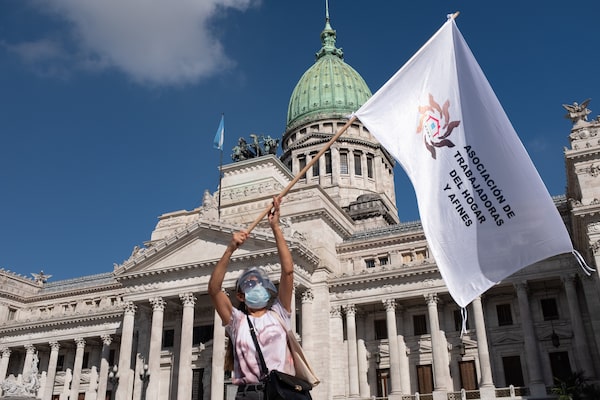
Estela Abila, president of the Asociación de Trabajadoras del Hogar y Afines (Association of Household and Related Workers), flies her organization's flag in front of Argentina's legislature at an April protest.Photography: Anita Pouchard Serra with the support of the Putlizer Center for Crisis Reporting/The Globe and Mail
This series was produced in partnership with the Pulitzer Center.
On a Saturday in April, with the sun shining and a light breeze wafting through the open windows of a turn-of-the-century building, a group of 18 women lift plastic champagne flutes to mark an historic moment they had created together.
All the women are domestic workers in and around the Argentine capital – cleaning, minding children, caring for elderly people. At the best of times, it’s work that is marginalized and undervalued. And these are not the best of times.
In October, with the country in virtual shutdown and tens of thousands of women left unemployed, they began to organize protests outside the Ministry of Labour. That’s when they realized they weren’t alone. Several months and several protests later, the 18 women came together to create a new labour association called Asociacion de Trabajadoras del Hogar y Afines (Association of Household and Related Workers). Its mission is to improve the conditions under which these women work, raising the paltry wages that has many living below the poverty line and fighting to ensure labour protections are met.
“This is something that is collective. We’re all fighting for the same thing,” says Estela Abila, the union’s president, who has spent 40 of her 59 years cleaning homes in Buenos Aires. “That all the girls become visible, that they recognize that we’re professionals.”
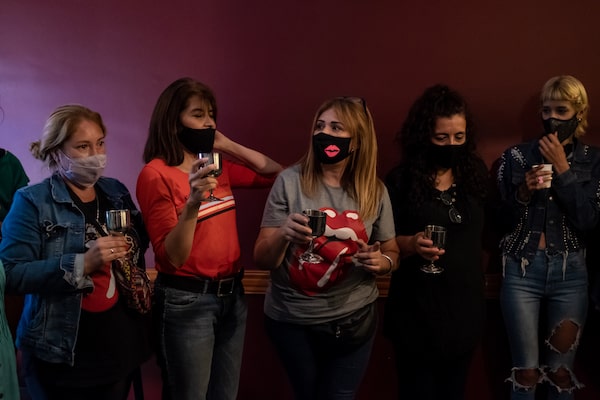
Domestic workers celebrate at the Trabajadoras del Hogar y Afines launch event on April 4.
The union is one of several new collective spaces that have opened up in Argentina, spearheaded by women workers themselves who have seen during this last year how thin the line is between survival and destitution. It’s also part of a larger, louder feminist movement that has put Argentine women’s issues in the spotlight with massive demonstrations and key legislative victories.
While unions existed before the pandemic, the vast majority of these household workers had never participated in one. So far, around 300 women have joined Trabajadoras del Hogar y Afines, and another 3,000 have made inquiries about signing up.
The sector has strength in numbers. According to the government, some 1.4 million people worked in the sector prepandemic, 99 per cent of them women. All told, they represent 8 per cent of the country’s workforce and 17 percent of all working women. Almost half are the sole breadwinners in their homes, even though the government-stipulated wage is about 28,500 pesos a month, or roughly $360 – which is less than half of what would put a family of four above the poverty line in Argentina. (The sector is supposed to see a 42-per-cent increase in wages over the next year, but that won’t even keep up with inflation in a country whose economy is notoriously volatile.)
“We can’t just keep bowing our heads and doing things for two bucks,” Ms. Abila says. “We have to wake up.”
Angelica Lopez, one of the leaders of another new union for household workers formed inside the Partido Obrero (Workers’ Party) notes most of her colleagues work long hours at several houses. And even then, she says, “we can’t earn enough to pay for food.”

Estela Abila starts her day of work at different houses. She has been working in the domestic sector for 40 years, and feels such jobs are undervalued at the best of times.
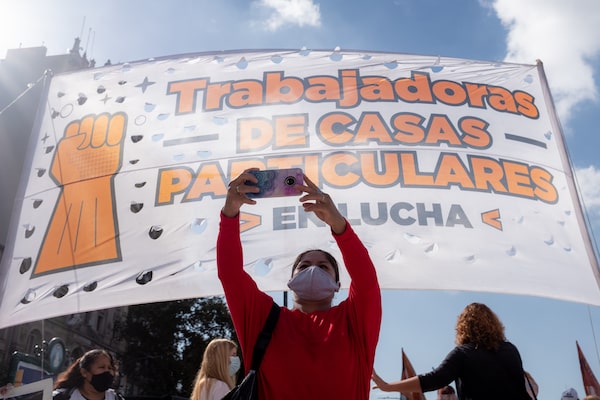
Domestic worker Angelica Lopez attends a protest led by labour organizations – including the newly formed Trabajadoras de Afines y Hogares – in Buenos Aires in April.
In 2013, Argentina enacted legislation to protect domestic workers, demanding employers register household staff, make contributions toward their retirement and provide some measure of job security.
But the vast majority of household workers remain unregistered, which means they must negotiate their own hourly wages and have no safety net in the event of a crisis COVID-19.
Though domestic workers should have continued to receive their wages throughout the pandemic shutdown, like others who were forced to stay home, many lost their income or their jobs altogether.
A recent study by the University of Avellaneda said there were 317,000 fewer domestic services positions in the fourth quarter of 2020 compared to the same period in 2019.
Some employers faked job titles to get around restrictions and keep women working, despite the health risk it posed. Undocumented migrants faced added difficulties, unable to access the financial aid provided by the government and fearing the risk of deportation.
Household workers were also stigmatized during the pandemic, after a local celebrity seemed to blame her live-in helper for infecting her family with the virus. For many, the incident highlighted the power imbalance and injustice that has been naturalized in the working relationship.

Andrea Antuñez is a domestic worker and one of the founders of the Trabajadoras del Hogar y Afines. Of the 1.4 million people who work in the domestic sector in Argentina, 99 per cent are women.
“We have to deconstruct this idea that these women are vulnerable because of their own traits,” says Macarena Romero, a political scientist who investigates issues related to migration, gender and care work. “It’s the context that makes them vulnerable.”
The government has taken steps to try to increase compliance with the law, sending letters to households asking them to register their employees. Activists say it clearly has to do more, while some analysts suggest the government needs to come up with tax policies that incentivize employers to comply with the rules.
“They would rather fire you than recognize those 10 years in which they didn’t pay [the contributions] that would mean the difference between a pension or not for us,” says Susana Orellana, 37, who works in a gated community on the outskirts of the capital city and is a member of the Trabajadoras del Hogar y Afines.
To get to work, Ms. Orellana takes a train, a bus and then walks a stretch with a parade of other women who do the same work she does. On those walks, she hears the world of difference that exists within the work force. During the pandemic, her employer paid her salary for the duration of the shutdown and never insisted she come to work before the rules permitted it. She gets vacation days and time off when necessary, and the family hired a second worker to help with her load. Some of her colleagues say they can’t even ask for a glass of water on their breaks – if they get them at all. “I don’t know if I feel lucky – I feel like they are employers who meet the requirements,” Ms. Orellana says. “We carry out the most important function in a household. But not everyone knows their rights, and that’s why we are mistreated. Some women don’t know how to read.”
Andrea Antunez, 51, believes training is key. She has been working in households for eight years. Now she’s developing a workshop to help colleagues professionalize their skills and negotiate better working conditions. “Sometimes it’s difficult for us to make our employers understand why we should be paid more for certain functions,” she said. “I learned through experience.”
That’s the sort of work AMUMRA, the Asociacion de Mujeres Unidas, Migrantes y Refugiadas, which represents migrant and refugee women, has also been doing for years. It pushed for the 2013 law that enshrined the registered workers protections, and holds seminars about what their rights are under that law. “We are trying to empower them so that they can achieve their autonomy,” says Natividad Obeso, the founder of AMUMRA and a former household worker.
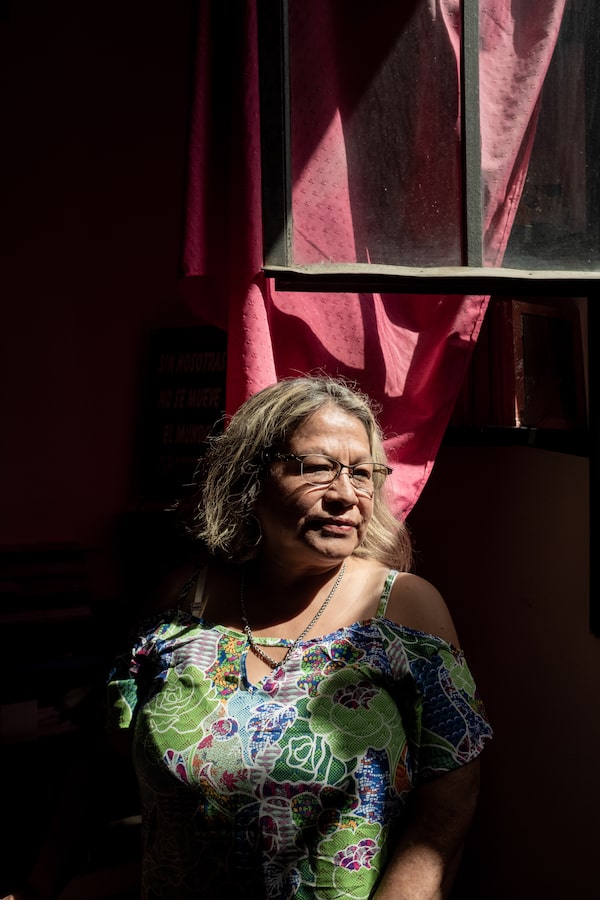
Natividad Obeso is the founder of AMUMRA, a Buenos Aires-based aid organization.
Another factor is the close relationships that sometimes develop between employer and employee. Domestic workers are often told they’re “part of the family” – and while genuine affection may exist, it only makes it harder to push back against unfair working conditions.
It’s all part of a larger battle around the recognition of care work in Argentina, says Ms. Romero, the political scientist.
“I don’t think the employers don’t register the workers because the process is complex, because they don’t understand the law or because it ends up being more expensive than what they have to pay them,” Ms. Romero says. “I think they don’t do it because they don’t perceive house work as work.”
Although she has been treated well in most of the houses where she worked, Ms. Abila says she, too, came up against the harsh reality when an employer suddenly laid her off. The woman refused to pay her severance, after 22 years of working in her home.
“Don’t give your years away, Estela,” her husband, Mario, told her. She hired a lawyer and settled on an amount that was less than what she was entitled to. But at least it was something, Ms. Abila said.
“As much as [the political class] does not want to see demonstrations, they have to occur because how else do you make the government listen to your protest, your demands, your concerns?” said Ms. Lopez, a member of one of the other unions. “They won’t pay me if I get sick. We have no guarantees. So if you’re sick, you have to pretend you’re okay, and go to work. Because if I don’t die from Covid, I’m going to die from hunger. "
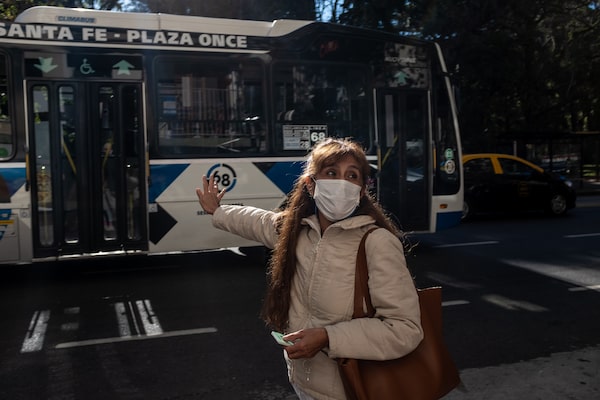
Ms. Abila sets off on the bus for another day on the job.
Our Morning Update and Evening Update newsletters are written by Globe editors, giving you a concise summary of the day’s most important headlines. Sign up today.